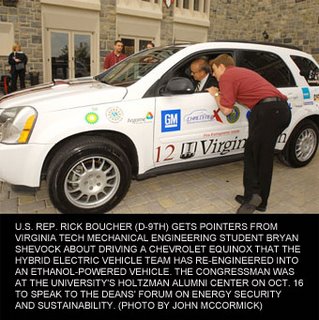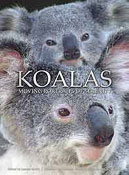Energy research showcase at Virginia Tech
The Energy Research Engagement Showcase, Nov. 29-30, being held at The Inn at Virginia Tech and Skelton Conference Centers will feature more than 300 energy-related endeavors by universities in Virginia.
 Sponsored by Virginia Tech’s Office of Economic Development and the Deans' Task Force for Energy Security and Sustainability, the showcase will foster commercialization of research from Virginia universities in the energy and energy-related environmental fields, enhance public-private partnerships that will make Virginia a leader in energy security and sustainability, stimulate economic development, and facilitate the adoption of profitable energy solutions. The showcase is part of Virginia Tech’s “Energy Ideas” initiative, a year-long series of events designed to increase dialogue within the university and acquaint the public with Virginia Tech’s efforts related energy innovations.
Sponsored by Virginia Tech’s Office of Economic Development and the Deans' Task Force for Energy Security and Sustainability, the showcase will foster commercialization of research from Virginia universities in the energy and energy-related environmental fields, enhance public-private partnerships that will make Virginia a leader in energy security and sustainability, stimulate economic development, and facilitate the adoption of profitable energy solutions. The showcase is part of Virginia Tech’s “Energy Ideas” initiative, a year-long series of events designed to increase dialogue within the university and acquaint the public with Virginia Tech’s efforts related energy innovations.
Some of Virginia Tech’s 300 energy projects have already produced significant results. Among these is the Frequency Monitoring Network (FNET), deployed in response to the August 2003 blackout that affected 50 million people in the United States. FNET can pinpoint the location of a power grid problem before a cascading effect can again cripple large parts of the nation. Today, FNET consists of more than 30 Frequency Disturbance Recorders positioned around the United States and managed centrally at Virginia Tech. The simplicity of the technology from a user’s point of view is astounding. Frequency Disturbance Recorders have no installation costs; the user just plugs a unit into a standard electrical outlet. Virginia Tech has received a U.S. patent for this technology.
Other key Virginia Tech energy inventions include economical fuel cell materials, a cost-effective bi-directional DC/DC current converter adopted by Ballard Power Systems, a Method and Apparatus for Packaging Fiber Optic Sensors for Harsh Environments that make oil wells more productive licensed to Tubel Technologies, and a Hydrogen-Selective Silica-based membrane licensed to ConocoPhillips.
Registration and a reception will take place from 6 to 9 p.m. Nov. 29 at The Inn at Virginia Tech and Skelton Conference Center on the university campus in Blacksburg, Va. On Nov. 30, the morning program will feature panels on non-renewable energy, renewable energy, and energy policy. In the afternoon, faculty members from Virginia universities will showcase their research through poster sessions and lab tours. Ample opportunity will be available for one-on-one time with the researchers.
The agenda will include discussions on Virginia’s efforts to commercialize energy research, renewable and non-renewable energy opportunities and challenges, energy policy, environment, infrastructure, and efficiency. There will be overviews of wind, biomass, solar, nuclear, fossil fuels, hydrogen, and fuel cell research at Virginia Tech and other Virginia public universities; industry perspectives; and government initiatives relating to energy.
To learn more and register, visit http://www.research.vt.edu/energy. For other information about the showcase, contact Virginia Tech’s Director of Economic Development Ted Settle at settle@vt.edu or (540) 231-5278.
Tours include:
Biofuels Lab (http://filebox.vt.edu/users/ypzhang/research.htm) – high efficiency cellulosic ethanol, hydrogen, and other valuable products from biomass using modest reaction conditions. Contact Y.-H. Percival Zhang, biofuels@vt.edu
Center for Intelligent Material Systems and Structures (http://www.cimss.vt.edu/)-- projects related to energy are Structural Health Monitoring of Wind Turbine Blades and Energy Harvesting for Small Electronics. Contact: Dan Inman, dinman@vt.edu
Center for Power Electronics Systems (http://www.cpes.vt.edu)-- power electronics applications from computers to transportation systems, from fundamental converter integration/packaging technologies to large power systems will be showcased. Contact: Fred Wang, wangfred@vt.edu
Center for Sustainable Mobility at the Virginia Tech Transportation Institute (http://www.vtti.vt.edu/index.cfm?fuseaction=DisplayResearchGroup&divisionID=8) -- See the mobile traffic laboratory, on-board emission measurement instrumentation, remote sensing emission sensors, simulation software to capture network-wide transportation-related energy consumption and emissions. Contact: Hesham Rakha, hrakha@vt.edu
Future Energy Electronics Center (www.feec.ece.vt.edu/) -- working prototypes of high efficiency power conditioning systems for fuel cells, solar photovoltaic devices, and thermoelectric generators. Contact: Jason Lai, laijs@vt.edu
Green Computing: Reducing global warming in your machine room -- a tour of several power-efficient high-end prototypes. Contacts: Wu Feng, director of Synergy research laboratory, feng@cs.vt.edu; Kirk Cameron, director of SCAPE research laboratory, cameron@cs.vt.edu
Microwave Processing Research Facility (http://www.mse.vt.edu/microwaves/) -- using stockpiles of radioactive waste to create fuel pellets. Contact: Diane Folz, dfolz@mse.vt.edu
Multidisciplinary Analysis and Design Center for Advanced Vehicles (http://www.aoe.vt.edu/research/collaborative/mad/), Contact: Rakesh K. Kapania, rkapania@vt.edu
Photochemical Capabilities to Study Nanomaterials -- synthesis and characterization of new mixed-metal supramolecular complexes and nanomaterials capable of converting solar light to other useable forms of energy such as hydrogen. Contact: Karen J. Brewer, kbrewer@vt.edu
Power Grid Situation Awareness Monitoring System (http://www.powerit.vt.edu/), Contact:Yilu Liu, fdr@vt.edu
Virginia Tech Fuel Cell Experimental Research Labs -- an overview of experimental fuel cell research, including proton exchange membrane fuel cells and nanowire microbial fuel cells that use waste water to produce electricity. Contacts: Scott Case, David Dillard, Michael Ellis, Jack Lesko, Nancy Love, James. McGrath, Ishwar Puri, jlesko@vt.edu
Greener Neaws Room
Keywords:: ENERGY RESEARCH COMMERCIALIZATION ECONOMIC DEVELOPMENT RENEWABLE ALTERNATIVE
 Sponsored by Virginia Tech’s Office of Economic Development and the Deans' Task Force for Energy Security and Sustainability, the showcase will foster commercialization of research from Virginia universities in the energy and energy-related environmental fields, enhance public-private partnerships that will make Virginia a leader in energy security and sustainability, stimulate economic development, and facilitate the adoption of profitable energy solutions. The showcase is part of Virginia Tech’s “Energy Ideas” initiative, a year-long series of events designed to increase dialogue within the university and acquaint the public with Virginia Tech’s efforts related energy innovations.
Sponsored by Virginia Tech’s Office of Economic Development and the Deans' Task Force for Energy Security and Sustainability, the showcase will foster commercialization of research from Virginia universities in the energy and energy-related environmental fields, enhance public-private partnerships that will make Virginia a leader in energy security and sustainability, stimulate economic development, and facilitate the adoption of profitable energy solutions. The showcase is part of Virginia Tech’s “Energy Ideas” initiative, a year-long series of events designed to increase dialogue within the university and acquaint the public with Virginia Tech’s efforts related energy innovations.Some of Virginia Tech’s 300 energy projects have already produced significant results. Among these is the Frequency Monitoring Network (FNET), deployed in response to the August 2003 blackout that affected 50 million people in the United States. FNET can pinpoint the location of a power grid problem before a cascading effect can again cripple large parts of the nation. Today, FNET consists of more than 30 Frequency Disturbance Recorders positioned around the United States and managed centrally at Virginia Tech. The simplicity of the technology from a user’s point of view is astounding. Frequency Disturbance Recorders have no installation costs; the user just plugs a unit into a standard electrical outlet. Virginia Tech has received a U.S. patent for this technology.
Other key Virginia Tech energy inventions include economical fuel cell materials, a cost-effective bi-directional DC/DC current converter adopted by Ballard Power Systems, a Method and Apparatus for Packaging Fiber Optic Sensors for Harsh Environments that make oil wells more productive licensed to Tubel Technologies, and a Hydrogen-Selective Silica-based membrane licensed to ConocoPhillips.
Registration and a reception will take place from 6 to 9 p.m. Nov. 29 at The Inn at Virginia Tech and Skelton Conference Center on the university campus in Blacksburg, Va. On Nov. 30, the morning program will feature panels on non-renewable energy, renewable energy, and energy policy. In the afternoon, faculty members from Virginia universities will showcase their research through poster sessions and lab tours. Ample opportunity will be available for one-on-one time with the researchers.
The agenda will include discussions on Virginia’s efforts to commercialize energy research, renewable and non-renewable energy opportunities and challenges, energy policy, environment, infrastructure, and efficiency. There will be overviews of wind, biomass, solar, nuclear, fossil fuels, hydrogen, and fuel cell research at Virginia Tech and other Virginia public universities; industry perspectives; and government initiatives relating to energy.
To learn more and register, visit http://www.research.vt.edu/energy. For other information about the showcase, contact Virginia Tech’s Director of Economic Development Ted Settle at settle@vt.edu or (540) 231-5278.
Tours include:
Biofuels Lab (http://filebox.vt.edu/users/ypzhang/research.htm) – high efficiency cellulosic ethanol, hydrogen, and other valuable products from biomass using modest reaction conditions. Contact Y.-H. Percival Zhang, biofuels@vt.edu
Center for Intelligent Material Systems and Structures (http://www.cimss.vt.edu/)-- projects related to energy are Structural Health Monitoring of Wind Turbine Blades and Energy Harvesting for Small Electronics. Contact: Dan Inman, dinman@vt.edu
Center for Power Electronics Systems (http://www.cpes.vt.edu)-- power electronics applications from computers to transportation systems, from fundamental converter integration/packaging technologies to large power systems will be showcased. Contact: Fred Wang, wangfred@vt.edu
Center for Sustainable Mobility at the Virginia Tech Transportation Institute (http://www.vtti.vt.edu/index.cfm?fuseaction=DisplayResearchGroup&divisionID=8) -- See the mobile traffic laboratory, on-board emission measurement instrumentation, remote sensing emission sensors, simulation software to capture network-wide transportation-related energy consumption and emissions. Contact: Hesham Rakha, hrakha@vt.edu
Future Energy Electronics Center (www.feec.ece.vt.edu/) -- working prototypes of high efficiency power conditioning systems for fuel cells, solar photovoltaic devices, and thermoelectric generators. Contact: Jason Lai, laijs@vt.edu
Green Computing: Reducing global warming in your machine room -- a tour of several power-efficient high-end prototypes. Contacts: Wu Feng, director of Synergy research laboratory, feng@cs.vt.edu; Kirk Cameron, director of SCAPE research laboratory, cameron@cs.vt.edu
Microwave Processing Research Facility (http://www.mse.vt.edu/microwaves/) -- using stockpiles of radioactive waste to create fuel pellets. Contact: Diane Folz, dfolz@mse.vt.edu
Multidisciplinary Analysis and Design Center for Advanced Vehicles (http://www.aoe.vt.edu/research/collaborative/mad/), Contact: Rakesh K. Kapania, rkapania@vt.edu
Photochemical Capabilities to Study Nanomaterials -- synthesis and characterization of new mixed-metal supramolecular complexes and nanomaterials capable of converting solar light to other useable forms of energy such as hydrogen. Contact: Karen J. Brewer, kbrewer@vt.edu
Power Grid Situation Awareness Monitoring System (http://www.powerit.vt.edu/), Contact:Yilu Liu, fdr@vt.edu
Virginia Tech Fuel Cell Experimental Research Labs -- an overview of experimental fuel cell research, including proton exchange membrane fuel cells and nanowire microbial fuel cells that use waste water to produce electricity. Contacts: Scott Case, David Dillard, Michael Ellis, Jack Lesko, Nancy Love, James. McGrath, Ishwar Puri, jlesko@vt.edu
Greener Neaws Room
Keywords:: ENERGY RESEARCH COMMERCIALIZATION ECONOMIC DEVELOPMENT RENEWABLE ALTERNATIVE



11:29 AM









<< Home